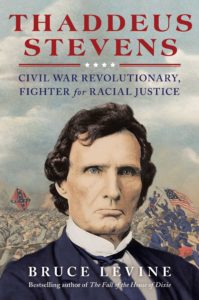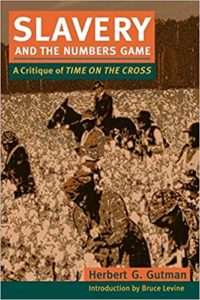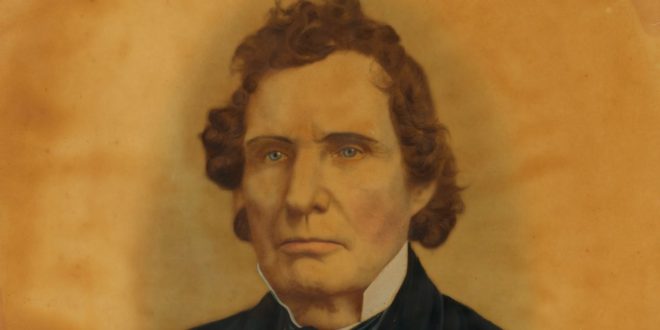Podcast: Play in new window | Download (Duration: 59:00 — 81.0MB)
 Born in poverty in rural Vermont, the Pennsylvania politician, Thaddeus Stevens, was among the first to see the Civil War as an opportunity for a second American revolution—a chance to remake the country as a true democracy which meant equal suffrage for all and more importantly the necessity of being a landowner.
Born in poverty in rural Vermont, the Pennsylvania politician, Thaddeus Stevens, was among the first to see the Civil War as an opportunity for a second American revolution—a chance to remake the country as a true democracy which meant equal suffrage for all and more importantly the necessity of being a landowner.
One of the foremost abolitionists in Congress in the years leading up to the war, he was a leader of the young Republican Party’s radical wing, fighting for anti-slavery and anti-racist policies long before party colleagues like Abraham Lincoln endorsed them.
During the Reconstruction era following the Civil War, Stevens demanded equal civil and political rights for black Americans, rights eventually embodied in the 14th and 15th amendments. But while Stevens in many ways pushed his party, and public opinion, towards equality, his radical notion to confiscate all large plantation property and give it to the formerly enslaved, was a bridge too far for the United States of Private Property.
 In what follows we point up the contradictions inherent in certain economic doctrines, particularly that of the yeoman farmer as the backbone of an egalitarian nations, and the assertion that industrialization was the key to economic prosperity – No one’s a freeholder who works in a factory. Our guest, Bruce Levine, happily sets the antebellum political and economic stage for us.
In what follows we point up the contradictions inherent in certain economic doctrines, particularly that of the yeoman farmer as the backbone of an egalitarian nations, and the assertion that industrialization was the key to economic prosperity – No one’s a freeholder who works in a factory. Our guest, Bruce Levine, happily sets the antebellum political and economic stage for us.
Our first segment might seem secondary to the program proper – but it seeks to place the discipline, practice, and publication of history in political context. Our example is the backlash to the 1960s and early 70s in the United States in which Bruce Levine plays a small but important part. Our focus is on the near universal acclaim (and promotion) of the book Time on the Cross: The Economics of American Negro Slavery by the economists Robert Fogel and Stanley L. Engerman published in 1974, and the almost immediate critique of the book by Herbert Gutman titled Slavery and the Numbers Game which highlights its myriad errors and false assumptions regarding empirical data.
 GUEST
GUEST
Bruce Levine is professor emeritus of history at the University of Illinois and the bestselling author of four books on the Civil War era, including The Fall of the House of Dixie and Confederate Emancipation and The Spirit of 1848: German Immigrants, Labor Conflict, and the Coming of the Civil War. His new book, and our primary text for today’s conversation is Thaddeus Stevens: Civil War Revolutionary, Fighter for Racial Justice, published by Simon & Schuster.
RELATED
Thaddeus Stevens by Peter Carlson
The Radicalism of Thaddeus Stevens (book review)
Thaddeus Stevens review: the Radical Republican America should remember (book review)
The Urgency of a Third Reconstruction by Robert Greene
 MUSIC – Charles Ives
MUSIC – Charles Ives
Though Charles Ives was one of the great composers of the early 20th century, and his Concord Sonata is well known and highly regarded, it was as a pioneer in the insurance business that many of his own friends and family knew him.
“Variations on ‘America'” performed by The Philadelphia Orchestra (Eugene Ormandy)
“Putnam’s Camp, Redding, Connecticut” performed by The Philadelphia Orchestra (Eugene Ormandy)
“The ‘St. Gaudens’ in Boston Common (Col. Shaw and his Colored Regiment)” performed by The Philadelphia Orchestra (Eugene Ormandy)
“Decoration Day” performed by Tamsin Waley-Cohen (violin) and Huw Watkins (piano)
“The Cage” performed by Kneebody and Theo Bleckmann
ID breaks – “The New River” performed by Kneebody and Theo Bleckmann
CREDITS
Producer & Host: Doug Storm
Executive Producer: Kade Young
 WFHB Bloomington Community Radio
WFHB Bloomington Community Radio


